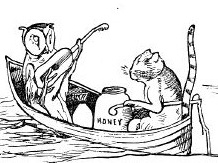Five Childhood Lyrics

Five Childhood Lyrics is a composition by John Rutter . He set five texts, two poems and three nursery rhymes to music , for a cappella choir , which usually sings in four voices, but is sometimes further divided. Rutter composed the work for the London Concord Singers , which first performed it in 1973.
The five songs are:
- Monday's Child
- The Owl and the Pussycat
- Windy Nights
- Matthew, Mark, Luke and John
- Sing a Song of Sixpence
The first song sets Monday's Child to music , a nursery rhyme that assigns a character to each of the seven days of the week. The lyrics of the second song are The Owl and the Pussy-cat , a nonsense poem by Edward Lear published in 1871. The third song sets a poem by Robert Louis Stevenson , Windy Nights ("Windy Nights"). The text of the fourth song is again a nursery rhyme, Matthew, Mark, Luke and John , a call from the four evangelists , which is also used as an evening prayer. The fifth song sets the nursery rhyme Sing a Song of Sixpence ("Sing a song from Sixpence ").
The composer commented: “The Five Childhood Lyrics are a kind of homage to the world of children. I chose some rhymes and verses that I remembered from early childhood and put them into music as simply as I could; however, the last of the five, which uses a familiar children's melody, contains a certain amount of winking embellishment ”. ( The Five Childhood Lyrics are a kind of 'homage' to the world of children. I chose for my texts some of the rhymes and verses remembered from my earliest years, and set them to music as simply as I could — though the last of the five, which uses a familiar nursery tune, contains a certain amount of tongue-in-cheek elaboration. ).
A reviewer for Gramophone magazine described the music as delightful , varied in character: fresh, thoughtful, relaxed or indulgent. Another reviewer said: "It's wonderful to come across the energy and witty ingenuity that characterize these early works." ( It's wonderful to be reminded of the energy and sharp-witted invention that characterize these youthful pieces .) Work was first published in 1974 by Oxford University Press .
The songs are part of the album Fancies with secular music by Rutter, recorded in 1991 under his direction by the Cambridge Singers . The album also contains the choir cycles Fancies and When Icicles Hang as well as the instrumental suite Antique . The songs were also recorded in 2002 by Nicol Matt and his Nordic Chamber Choir on another album with secular music by Rutters.
Individual evidence
- ↑ a b Fancies ( English ) collegium.co.uk. Retrieved August 13, 2014.
- ↑ a b John Bawden: Five Childhood Lyrics ( English ) directoryofchoralmusic.co.uk. Retrieved August 18, 2014.
- ↑ Fancies ( English ) Hyperion Records . Retrieved August 18, 2014.
- ↑ a b John Steane: Rutter I My Best Loved's Am (review) . In: Gramophone . 2002. Retrieved August 18, 2014.
- ↑ David Vernier: I My Best Beloved's Am (review) ( English ) Classics Today. Retrieved August 18, 2014.
- ^ John Rutter / Five Childhood Lyrics ( English ) Oxford University Press . Retrieved July 6, 2016.
- ↑ Five Childhood Lyrics . Oxford University Press, 1971.
- ↑ Fancies: Music by John Rutter at Allmusic (English)